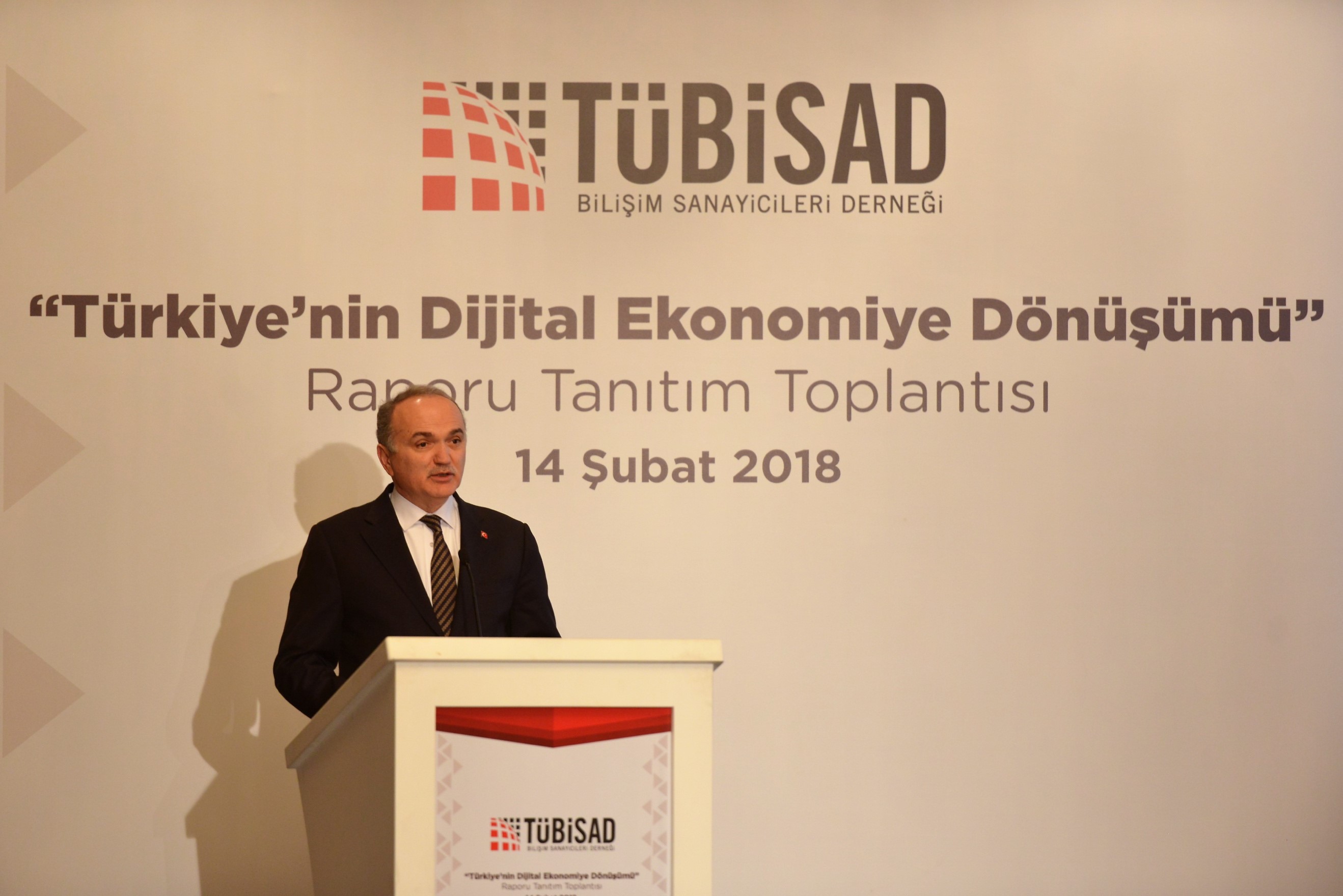TUBISAD, Released Report on Turkey's Transition into Digital Economy
TUBISAD introduced the report on "Turkey's Transition into Digital Economy" during a summit held at Ceylan Intercontinental Hotel on February 14, 2018, and Minister of Science, Industry And Technology Dr. Faruk Özlü also participated to the summit. President of TUBISAD Kübra Erman Karaca asserted that Turkey's transition into a digital economy based on high technology would only be possible if it would be adopted by public and private sectors and also whole society.

Turkish Informatics Industry Association (TUBISAD), released "Turkey's Transition into Digital Economy, IT Sector in Turkey: Its Place, Importance, Evolution and Benefits" to the public. Minister of Science, Industry And Technology Dr. Faruk Özlü and President of TUBISAD Kübra Erman Karaca made opening speech of the summit respectively and Ass. Prof. Ümit İzmen, Asst. Dr. Yılmaz Kılıçaslan, the authors of the report, as well as Devrim Sönmez and Serdar Urçar, the Management Consultants of TUBISAD, also made their speech.
Following the opening speech of Minister of Science, Industry And Technology Dr. Faruk Özlü continued his speech saying that the government launched its initiative for domestic and national production in all sectors, and thanked TUBISAD and its members for their report.

SUGGESTED POLICIES
President of TUBISAD Karaca said that TUBISAD devised some draft policies to boost information and communication technology sector and Turkey's transition into digital economy and continued her speech as follows:
"Before expressing our policy proposals, we want to draw attention to the importance of two issues in particular:
1.) A systematic guidance model and structure that promotes digital economic strategies and policies are imperative. The management system to be devised is supposed to address to not some specific people, sector or public institution, but all society, sectors and it should have also a control and audit function.
2.) The management, coordination and effectiveness of digital transition will be possible if the state fully promotes it at the highest level and taking an active role through legislation and laws thereof.

As TÜBİSAD, we consider there are 4 issues that require immediate attention:
1.) Proposals for the growth and digitization of the information and communication technologies sector.
- Incentives for R&D specific to information and communication technologies sector should be increased.
- Patent applications should be encouraged for information and communication technologies sector.
- Employment of information and communication technologies specialists should be incentivized.
- Entrepreneurship ecosystem should be developed in information and communication technologies sector.
- It should be aimed to increase the exports of technology products and services in information and communication technologies sector.
- Regarding technology, alternative product/service models should be adopted to eliminate dependency on foreign manufacturers or service providers.
- Models that enterprise companies can access and accelerate their development with new generation initiatives and solutions should be focused on.
2.) Recommendation for improving adoption of digital economy by individuals
- Increase in human resources adept at digital economy should be achieved.
- Early stage education system should prioritize tech-savvy, questioning and algorithmic thinking.
- Technology skills, such as writing software code, should be incorporated in the early stage education system.
- Local digital content production should be encouraged through special training programs and incentives.
- The scope of e-government services should be expanded rapidly and particularly encouraged to be used by citizens.
- Digital transformation of older and disadvantaged groups should be accelerated.
- Immigrant policies should be developed to attract qualified people, especially those with high digital competencies.
3.) Recommendations to promote digital transition of private sector
- Digital infrastructure investments i (Cloud Computing, Industry 4.0, Internet of Objects and Artificial Intelligence) should be incentivized for industry, services and agriculture sectors.
- Measures should be taken to increase the use of information and communication technologies in SMEs.
- E-commerce, mobile trade investments should be increased.
- Information security investments should be increased.
- Employment of female information and communication technologies specialists should be encouraged and incentivized.
- Human capital formation that can invest and manage in new generation business models should be prioritized.
- Business investments in new generation business models and technologies should be increased.
- Private sector investments for increased energy needs should increase.
- Access and sharing of data should be facilitated.
4.) Recommendations for regulatory and market developer role of public sector
- In order to further strengthen the communication infrastructure, the investments in the telecom sector should be continued and the sustainability of the investments should be supported.
- Steps should be taken to increase mobile and fixed broadband penetration, since increasing demand is closely related to dissemination of broadband.
- Measures should be taken to ensure that the use of computers and the Internet is particularly widespread among young people, women, the elderly, and low educational levels.
- Restrictions on freedom of access to internet should be in conformity with the EU norms.
- Domestic software and technology investments towards prevention of cyber security risks should be encouraged.
- The lack of financial resources in Venture Capital should be compensated by public resources.
- Private sector and individual investors' investment in new business models and technologies should be facilitated.
- The lack of financial resources in Venture Capital should be compensated by public resources.
- Business models that compete with the private sector should be prevented from adopting business models conflicting with competition.
- The use and sharing of common data by the public and private sectors should be ensured.
- The taxes imposed on information and communication technologies should be reduced.
- Short and long-term plans for domestic software and domestic content should be made. "